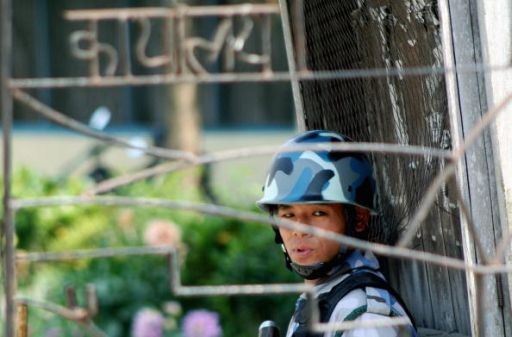A Nepalese security personnel member stands guard at the Chandraguri polling counting station in Eastern Nepal on April 11, 2008. DIPTENDU DUTTA/AFP/Getty Images
Nepal’s armed conflict ended six years ago, but commitments made to pursue accountability and establish oversight over security forces have yet to be implemented.
ICTJ’s briefing paper Building Trust and Strengthening the Rule of Law examines how an ad hoc vetting mechanism for officers in senior command positions could help consolidate democracy in Nepal. Author Alexander Mayer-Rieckh warns that as Nepal abandons its commitments to pursue accountability for serious crimes, it undermines the ability of its security forces to maintain the rule of law and protect a new era of peace.
From 1996 to 2006, Nepal experienced a brutal armed conflict between government forces and Maoist insurgents. The 2006 Comprehensive Peace Agreement (CPA) brought a formal end to the armed conflict and allowed Nepal to begin to build its democracy. While the CPA was a significant step toward reconciliation, its promises of truth, justice and accountability today remain unrealized.
“Building Trust and Strengthening the Rule of Law” shows how commitments made in the peace agreement, the interim constitution, and in other agreements have yet to be implemented. The failure to investigate conflict-era crimes has meant many of Nepal’s security forces have been promoted instead of investigated.
Today, societies transitioning from conflict or repression often come to recognize that an end to conflict doesn’t necessarily bring an end to impunity.
In 2007 ICTJ conducted a survey with victims and their families in Nepal on a range of transitional justice issues. In reflecting on the peace process, a man in Baglung noted that genuine peace cannot be obtained through “just setting doves free.”
In the aftermath of serious international crimes, states have an obligation to prevent their recurrence through comprehensive reform of governing institutions. As a cornerstone of transitional justice, institutional reform helps societies uncover systems of corruption, abuse and impunity that have facilitated crimes in the past.
|
The briefing paper shows how this cycle of impunity becomes further entrenched when security sector reform is ignored: permitting abusive officers to remain in public service protects them from being held accountable and ignores the fundamental rights of victims. |
The paper confirms that security institutions depend on the trust of citizens to function effectively. Removing officers involved in serious crimes can help to restore public faith institutions, a faith that is noticeably absent in Nepal. In ICTJ’s 2007 survey, respondents expressed the lowest amount of trust in the police and army: only 6 percent said that they trusted the police fully, and only 8 percent had full trust in the army.
The impact of a vetting process can be enhanced when used with other institutional reforms. To complement any vetting procedures, the briefing paper suggests Nepal could screen candidates for its security forces, limit the appointment powers of the executive branch of government, provide avenues for redress internally and for the public, secure the operational autonomy of security institutions with effective civilian oversight, and change symbols that are associated with abusive practices.
Despite significant challenges in establishing a process of reform, “Building Trust and Strengthening the Rule of Law” argues that if Nepal chooses not to vet, citizens in Nepal could resort to other means of conflict resolution and take the law into their own hands. By removing officers who were involved in serious crimes in the past from the army, the police, and other security institutions, Nepal can help to restore confidence among citizens and the world that no one is above the law.
